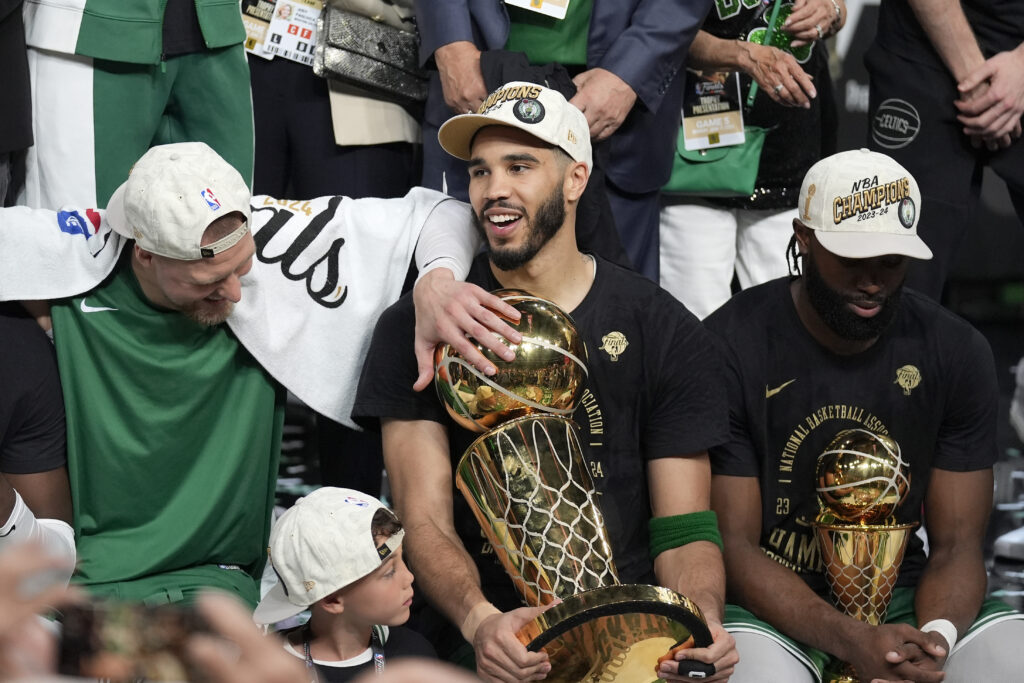There are reasons to love the Celtics, but not enough to squash our hate

By DERON SNYDER (as published by theGrio)
Prior to Boston’s series-clinching rout in Game 5 of the NBA Finals, my colleague Touré said it’s time to show some love for the “Blackified Celtics.”
That’s asking a lot from this native New Yorker.
For us, detesting Boston begins in our wee years. Rites of passage include a lesson on the flea market of racism to our north. The chilling picture of a Black man nearly speared during a 1976 busing protest was way too reminiscent of the South our elders fled. Bostonians’ hard accents could spark the same sense of uneasiness that a country drawl triggered. It doesn’t help that the damn Celtics now have 18 NBA titles while our beloved Knicks have just two (none since 1973).
However, I’m capable of giving credit where credit is due. And my longstanding philosophy on suspected or certified racists is clear: I couldn’t care less about their feelings toward Black people as long as we still secure the loans, jobs, houses, services, etc. that we’d get with white skin. Hate us all you want but don’t hinder.
I must admit that the Celtics operate in a manner that’s counterintuitive to Boston’s reputation.
Yes, the franchise goes overboard to find white ballers who’ll placate the home crowd, whether with stars like Larry Bird or scrubs like Brian Scalabrine. When Boston won the title in 1986, white NBA players were an endangered species but the Celtics had eight of them! Such roster construction doesn’t happen by accident.
But despite its notoriety as a symbol of whiteness, the team has been quick to recognize and reward Black excellence. Not that the following lowers our hate for the Celtics, but …
Boston was the first NBA team to draft a Black player (Chuck Cooper in 1950) and the first to feature an all-Black starting lineup (1964). The Celtics were the first team to hire a Black head coach (Bill Russell in 1966) and were instrumental in the league hiring its first Black full-time referee (Ken Hudson in 1969).
Any other franchise with those bona fides would be Black America’s team. And we’d love rooting for the current squad, led by Jayson Tatum and Jaylen Brown. The two Jays are a great story, examples of talent, patience and persistence coming together for a championship. They’ve spent seven seasons together, giving the Celtics a homegrown feel that didn’t exist when Kevin Garnett and Ray Allen arrived in 2007-08 and instantly won a title with Paul Pierce.
Much to my chagrin, my daughters loved those Celtics (particularly Rajon Rondo) and they rooted for Boston against Dallas. In different jerseys, Brown and Tatum would be easy to cheer for. “We’ve been through a lot,” Brown said Monday after winning the Finals MVP award. “The losses, the expectations, the media. People saying we can’t play together, we can’t win. We just blacked it out. He trusted me and I trusted him. And we did it together.”
I really wouldn’t mind pulling for them under different circumstances. I gave in two years ago due to my crush on Nia Long, but now she’s done with Boston, too, after former coach Ime Udoka’s shenanigans. Whatever we say about the franchise, it doesn’t mind putting a Black man in charge. Of the seven Black coaches to win an NBA title, four of them coached the Celtics. Three of Boston’s last four coaches have been Black, including 35-year-old Joe Mazzulla.
Touré and other Black native Bostonians are understandably frustrated, wondering why our anti-Celtics fervor remains so vibrant. “The current Celtics core group is very Black,” he wrote. “Why not give some love to the modern Blackified Celtics?”
Sorry, but that’s not what we do. It’s anathema to self-respecting Black sports fans who weren’t born in the region. Black residents comprise 21% of the city’s population and I imagine it’s maddening when we trash Boston for racism that flows throughout the nation. But we all got burdens to bear.
“Having to defend Boston is a real sport,” Black Owned Boston founder Jae’da Turner told The Boston Globe. “As a student at Northeastern, people coming from New York, California, and all across the country, I think they honestly love to hate Boston. It’s like a little club. It’s not cool if you say you’re from Boston.”
People don’t choose where they’re from, but they choose who they support. Listening to vulgar fans’ verbal abuse of Dallas Mavericks star Kyrie Irving – throughout the games in Boston and afterward – was reason alone to hope the Celtics lost.
As I explained to my daughters, I don’t have anything against the players.
I just never want to see those fans happy.
 Follow
Follow
